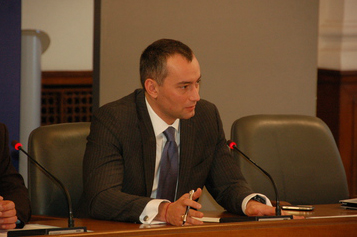Five years Bulgaria in EU
11 January 2012 News
Nickolay Mladenov: In spite of the debt crisis, the EU is the most desirable role model
“Bulgaria’s entry into the European Union five years ago was not just a success, but also great proof that we want to, and can, live differently. Today, we see that probably we have changed less than we wanted to, but more than some expected,” Foreign Minister Nickolay Mladenov told a joint news conference with Minister Tomislav Donchev at the Council of Ministers today on the occasion of Bulgaria having been an EU member for five years.
In political terms, Bulgaria’s accession to the EU brought the country stability and the strengthening of democracy, while internationally, the country had moved from being a subject of EU policies to becoming an active participant in them, Minister Mladenov said.
Today Bulgaria is part of the largest domestic market in the world, where goods, capital, services and people move freely. Minister Mladenov listed the achievements of Bulgaria’s EU membership as including the establishment of co-ordination to implement the obligations of EU membership and of an effective mechanism for the implementation of EU legislation in Bulgaria.
“Currently, there are no cases against Bulgaria in the European Court of Justice for infringements of obligations. In five years of EU membership, Bulgaria has participated and will continue to do so, in making decisions within the institutions of the Union. So far, we have participated in discussions about and adoption of more than 500 directives, more than 3000 regulations and more than 200 decisions,” Minister Mladenov said. Steps have been taken to introduce into Bulgarian legislation more than 2200 EU Directives.
The two ministers announced the agreement at today’s Cabinet meeting on the Annual Programme for Bulgaria’s participation in the process of decision-making in the EU Action Plan for 2012, which highlights some of the key priorities for Bulgaria and positions that will be taken in debates in Europe.
Among these, the most important for Bulgaria are tackling the economic crisis, the 2014-2020 financial framework, reform of the Common Agricultural Policy and Cohesion Policy after 2013, joining the Schengen area and EU enlargement, Minister Mladenov emphasised.
He said that completion of negotiations on a new “fiscal union” of the EU is a priority for Member States, while Bulgaria will assume no financial obligations requiring additional contributions to the IMF and other financial organizations.
“We say ‘yes’ to fiscal discipline, but ‘no’ to interference in our right to pursue independent fiscal policies," the Foreign Minister underlined.
Bulgaria’s priorities in the EU in 2012
Economic and Financial Affairs
For Bulgaria, it is essential to participate in the further process of integration into the European Union, in defence of Bulgaria’s national interests. Thus, on December 30 2011, Ministers adopted a decision to confirm Bulgaria's intention to participate in negotiations on an international agreement on stronger economic union, in consultation with the National Assembly.
Essential elements:
• That the proposed project is an international agreement in accordance with the approved principles, followed by Bulgaria, on the maintenance of strict fiscal discipline and macro-financial stability.
• In the course of negotiations on the International Agreement, Bulgaria will not support proposals that would impair our right to pursue an independent fiscal policy.
• Enhanced co-operation in economic and fiscal policy should not jeopardize the effective functioning of the EU internal market.
• Bulgaria attaches priority to the rapid inclusion in the provisions of the international agreement on stronger economic union in the EU Treaties.
• The principle position of our country is the need for full compliance with the provisions of this Agreement with EU treaties and EU law, and that EU law has primacy over provisions of the Agreement. The role of existing European institutions should be preserved.
Multiannual financial framework 2014-2020
The proposal for the multiannual financial framework should provide funding for the ambitious objectives that the EU has set itself, while not precluding requirements for fiscal consolidation in the Member States. The next financial framework should aim to achieve smart, sustainable and inclusive growth in the EU and, through this, the objectives of the Europe 2020 strategy.
Reform of the Common Agricultural Policy (CAP) after 2013
The CAP should have a stable budget, ensuring the objectives enshrined in the Treaty on the European Union. It is important to us that direct payments are a necessary means to ensuring a minimum level of income of farmers while allowing them income from other economic activities.
The new EU cohesion policy after 2013
Support from the Structural and Cohesion Funds for basic infrastructure, investment in human capital and promoting small and medium enterprises will continue to be a priority for our country, because implementing this is a mandatory step towards unlocking the potential of the Bulgarian regions, enabling them to improve their competitiveness and sustainable growth.
Joining Schengen
In 2012 Bulgaria will continue to campaign actively, at political and expert level, with a view to adoption as soon as possible a decision on the accession of Bulgaria and Romania to the Schengen area.
Enlargement of the European Union
For Bulgaria, the main priorities in the process of decision-making in the EU will continue to include an ongoing process of enlargement on the basis of the renewed consensus on this policy achieved in December 2006. EU enlargement provides a strong impetus for the achievement of political and economic reforms in the Western Balkans and Turkey and a contribution to peace and security in Europe.
Link to the site of the Danish EU Presidency
